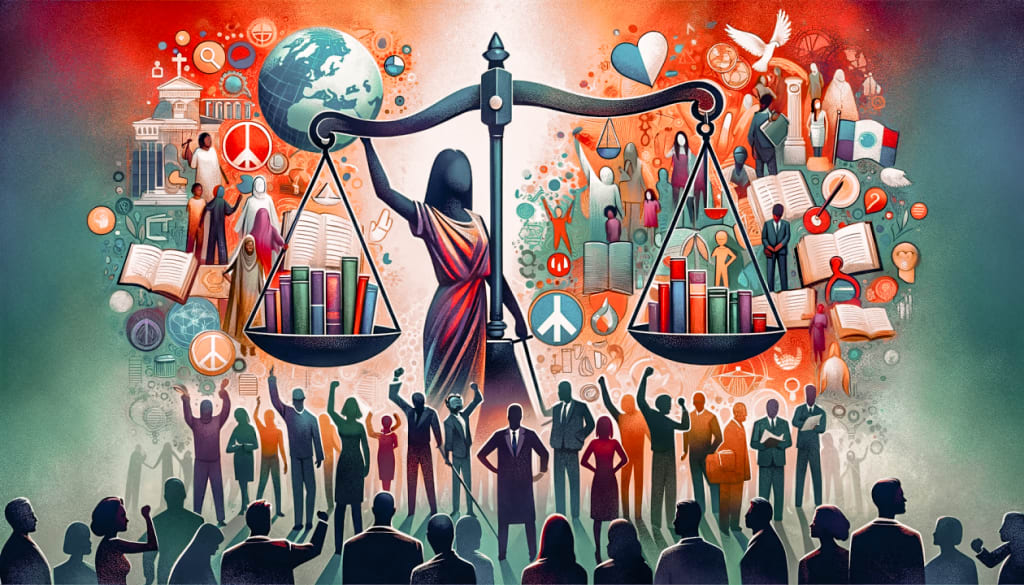Championing Human Rights and Social Justice: A Call to Action for a More Equitable World
Human rights and social justice are fundamental principles that lie at the heart of a fair and compassionate society. They encompass the inherent dignity, equality, and freedoms of all individuals, regardless of their background, identity, or circumstances. Yet, around the world, millions of people continue to face discrimination, oppression, and injustice, underscoring the urgent need for collective action to uphold and defend human rights for all. In this article, we'll delve into the significance of human rights and social justice, the challenges they face, and the steps we can take to advance them in our communities and beyond.

1. Understanding Human Rights: Upholding Dignity and Equality for All
Human rights are universal principles that recognize the inherent worth and dignity of every individual, regardless of factors such as race, ethnicity, gender, sexuality, religion, disability, or socioeconomic status. They encompass civil, political, economic, social, and cultural rights, including the right to life, liberty, equality, freedom of expression, education, and health. Human rights are enshrined in international legal instruments such as the Universal Declaration of Human Rights, which serves as a guiding framework for promoting and protecting human rights around the world.
2. The Importance of Social Justice: Addressing Inequality and Marginalization
Social justice is the pursuit of equality, fairness, and inclusion in society, with a focus on addressing systemic injustices and disparities that result in inequality and marginalization. It encompasses efforts to dismantle barriers to opportunity, challenge discriminatory practices, and create a more equitable distribution of resources and power. Social justice seeks to ensure that all individuals have access to the same rights, opportunities, and privileges, regardless of their background or identity. It is a fundamental principle for building a society that values diversity, respects human dignity, and promotes solidarity and cooperation among its members.
3. Challenges to Human Rights and Social Justice: Confronting Inequality and Oppression
Despite the progress made in advancing human rights and social justice, significant challenges persist around the world. Inequality, discrimination, poverty, violence, and systemic injustice continue to undermine the rights and dignity of millions of people, particularly those who are marginalized and vulnerable. Structural barriers such as racism, sexism, homophobia, transphobia, ableism, and economic exploitation perpetuate cycles of oppression and exclusion, denying individuals their basic rights and freedoms. Addressing these challenges requires a comprehensive and intersectional approach that recognizes the interconnectedness of social, political, economic, and cultural factors that shape human rights and social justice outcomes.
4. Promoting Human Rights and Social Justice: Empowering Communities and Advocating for Change
Promoting human rights and social justice requires collective action and advocacy at all levels of society, from grassroots initiatives to global movements for change. Empowering communities to advocate for their rights and hold governments and institutions accountable is essential for driving meaningful progress. This may involve raising awareness, organizing protests, lobbying policymakers, engaging in legal advocacy, and supporting grassroots organizations and movements working on the front lines of social change. It also requires building alliances and solidarity across diverse communities and movements, recognizing that the struggle for human rights and social justice is interconnected and requires collaboration and mutual support.
5. Educating and Mobilizing for Change: Fostering a Culture of Rights and Justice
Education and awareness are crucial tools for promoting human rights and social justice, empowering individuals to understand their rights, challenge injustice, and become agents of change in their communities. By integrating human rights education into school curricula, promoting media literacy, and fostering critical thinking skills, we can equip people with the knowledge and tools they need to advocate for justice and equality. Mobilizing public support and political will for human rights and social justice requires engaging diverse stakeholders, building coalitions, and amplifying the voices of those most affected by injustice.
Conclusion: Building a Future Rooted in Human Rights and Social Justice
In conclusion, human rights and social justice are foundational principles that demand our unwavering commitment and action. Upholding human rights requires challenging systems of power and privilege, dismantling barriers to equality and justice, and building inclusive societies where every individual can live with dignity and respect. By standing in solidarity with those who are marginalized and oppressed, advocating for systemic change, and fostering a culture of rights and justice, we can create a future where human rights are protected, social justice is upheld, and all people can thrive and flourish. Let us work together to build a world where human rights and social justice are not just ideals but lived realities for all.
About the Creator
Mohamed Ali
Mohamed Ali is a passionate writer and researcher with a keen interest in exploring the complexities of human behavior and society through the lens of sociology. With a background in sociology and psychology.






Comments
There are no comments for this story
Be the first to respond and start the conversation.